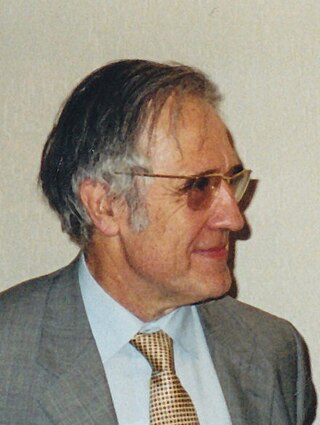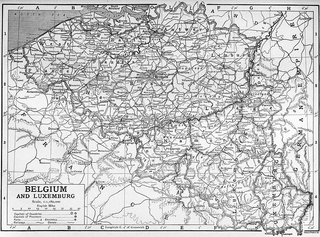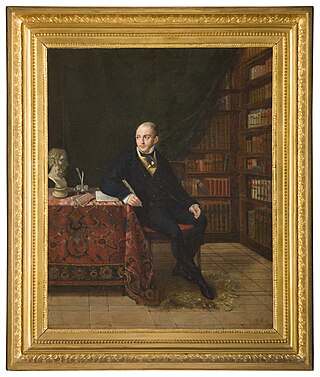Related Research Articles
Marc Quaghebeur is a Belgian poet and essayist. He is director of the Archives and Museum of Literature in Brussels. He has a truly Belgian surname. It derives from Dutch Kwagebeur and has been adapted to the French spelling tradition.
Jean Stengers was a Belgian historian.
Henri Storck was a Belgian writer,filmmaker and documentarist.

Marie Popelin was a Belgian jurist and early feminist political campaigner. Popelin worked with Isabelle Gatti de Gamond in the development of women's education and,in 1888,became the first Belgian woman to receive a doctorate in law. After her accession to the bar was refused,Popelin went on to have an active career as the leader of the Belgian League for Women's Rights. She died in 1913 without ever gaining admission to the bar.

Jules,Baron de Saint-Genois was a Belgian liberal politician,historian,librarian and professor at the University of Ghent. He was the first President of the Willemsfonds and a prolific contributor to the early volumes of the Biographie Nationale de Belgique,serving as president of the editorial committee.

Paul Gochet was a Belgian logician,philosopher,and emeritus professor of the University of Liège. His research was mainly in the fields of logic and analytic philosophy. He is perhaps best known for his works on Quine's philosophy.
Dominique Varry is a French historian of books and professor at École nationale supérieure des sciences de l'information et des bibliothèques,part of the University of Lyon.

Anne Morelli is a Belgian historian of Italian origins,specialized in the history of religions and minorities. She is currently assistant director of the Interdisciplinary center for study of religion and secularism of the UniversitéLibre de Bruxelles (ULB),where she is a teacher.

Théodore Juste was a Belgian historian and literary scholar. He became curator of the Musée royal d'antiquités,d'armures et d'artillerie in 1859.
Juliaan or Jules Mees (1876–1937) was a Belgian professor of historical geography,a specialist on the Portuguese discoveries,who in 1920 was condemned to two years in prison for collaboration during the German occupation of Belgium in World War I.
Louise van den Plas was a Belgian suffragist and the founder of the first Christian feminist movement in Belgium.
Marie Parent (1853–1934) was a Belgian journal editor,temperance activist,feminist and suffragist. She founded the Alliance des femmes contre les abus de l'alcool in 1905 and the Ligue belge des femmes rationalistes in 1920. For over 20 years,she headed and edited the Journal des Mères,for which she received the Adelson Castiau award from the Royal Academy of Belgium and a gold medal at the 1910 Brussels International Exhibition.
Events in the year 1871 in Belgium.
Events in the year 1861 in Belgium.
Prosper de Haulleville (1830–1898),who also wrote under the pen name Félix de Breux,was a Belgian journalist and author who was influential on his country's adoption of universal manhood suffrage with plural voting and proportional representation.

The following events took place during 1911 in Belgium.

The Sociétédes douze was scholarly and literary dining club in Brussels.
Camille Tihon (1890–1972) was a Belgian archivist and historian.
Éliane Gubin is a Belgian historian,researcher and professor of political and social history,specializing in the history of women and feminism. In the late 1980s,she initiated the introduction of women's history at the Universitélibre de Bruxelles (ULB),where she is professor emerita. She also teaches the history of contemporary Belgium and specializes in social history and political history of the nineteenth century and the first half of the twentieth century,including a re-reading of the World War I. Since 1995,she has been co-director of the Centre d'archives pour l'histoire des femmes.
Antonina Grégoire was a Belgian business engineer,feminist and communist. She joined the Belgian Partisans Armés resistance during the Second World War,and ran an intelligence gathering section,then post war became involved in politics before being expelled from the Communist Party because of her "bourgeois origins".
References
- 1 2 IDAFT, p. 10.
- 1 2 3 4 5 DFB, p. 523.
- 1 2 RBPH, p. 964
- 1 2 IDAFT, p. 11
- ↑ Entre modernisme et avant-garde. Le réseau des revues littéraires de l’immédiat après-guerre en Belgique (1919–1922), doctorate thesis of Daphné de Marneffe, Université de Liège, 2007, p. 167 (in French)
- ↑ "Structure du Groupement belge de la Porte Ouverte". www.porteouverte.be. Retrieved 21 January 2023.
- 1 2 RBPH, p. 965
- 1 2 RBPH, pp. 964-965
- ↑ Arnould, Maurice-Aurélien (1956). "Nécrologie - Suzanne Tassier-Charlier (1898-1956)". Revue belge de Philologie et d'Histoire. pp. 964–967. Retrieved 21 January 2023.
- ↑ "Striges - Maison des Sciences Humaines (MSH-ULB)". msh.ulb.ac.be. Retrieved 21 January 2023.
Bibliography
- Dictionnaire des femmes belges. XIX et XX siècles (DFB), Éliane Gubin (dir), Éditions Racine, Bruxelles, 2006, pp. 523–524. (in French)
- Inventaire détaillé des archives de la famille Tassier (IDAFT), Archives générales du Royaume, 1994. (in French)
- Revue belge de philologie et d'histoire (RBPH), Année 1956, Volume 34, Numéro 34–3, "Nécrologie de Suzanne Tassier-Charlier" par Maurice-Aurélien Arnould, pp. 964–967. (in French)